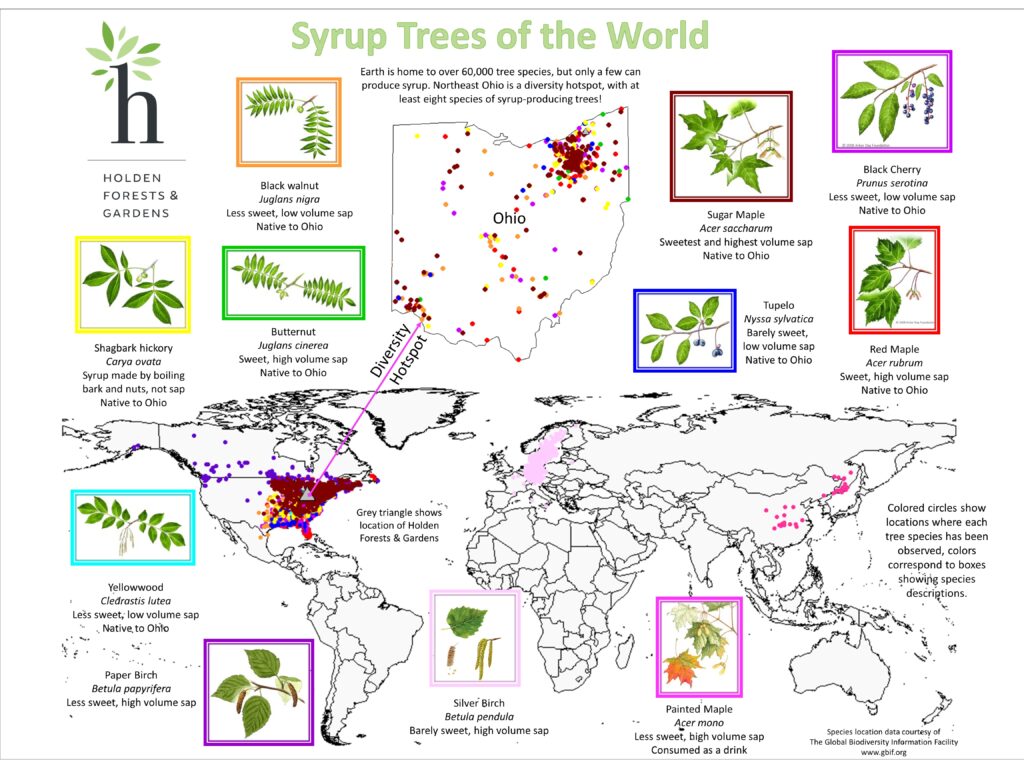Researchers in the Medeiros Lab are committed to conducting scientific research that has a positive impact in the real world, and to sharing that research in a way that is accessible for people at all levels, from K-12 to PhD.
You can follow us on Bluesky @julianamedeiros.bsky.social
Below are some examples of the types of outreach we do in our lab.
Art in the Science of Maple Sap – During the 2019 Holden Arboretum Pancake Breakfast (March 29-31), visitors were treated to art displays and activities about maple sap. The purpose of this exhibit was to connect visitors in a fun and whimsical way to a scientific mystery: scientists understand why plants have sap, and how maple sap runs occur, but maple sap runs are quite contrary to normal sap flow in plants, so why do maple trees have sap runs? We recruited artistic-minded staff and volunteers to help envision scientific concepts in sap flow research using print, fabric, sculptural, and mixed media artworks. We also designed an activity called The Drip Races for this event, which you can find out more about below.







The Drip Races – A demonstration and hands-on activity to teach plant water transport
The Drip Races is a simplified version of a device called a hydraulics manifold, which is used in real scientific studies to measure the rate of water transport in plants. The device has been modified for ease of set up and visual demonstration but can still be used to collect real data if desired.
The purpose is to teach the properties of the plant vascular system and how those properties translate into plant growth and drought survival, and to show how different plant species have different water transport properties depending on their leaf traits and the environmental conditions where they live.
Click here to get a copy of our lesson plans for the Drip Races.
Public Seminars – We make presentations aimed at a public audience as part of the Holden Arboretum Scientist Lecture Series, and at meetings of the American Rhododendron Society. Below are examples of some previous talks.
The Secret Life of Rhododendron Roots: a dramatic tale of diversity, divergence and disease resistance – Roots don’t catch your eye like a beautiful flower, instead they work silently and secretly underground, gathering water and nutrients to support plant growth. In order to optimize growth, root traits are closely matched to particular climates. But, roots don’t work alone, because the soil is home to billions of microbes, both friend and foe. In this seminar, Dr. Medeiros provides a background on the role of roots and soil microbes in plant health, highlight discoveries made in our lab about the dramatic diversity of roots within genus Rhododendron, and discuss how this root diversity relates to ecological and evolutionary processes. Lastly, this seminar covers the implications of these findings for native ecosystem conservation and restoration, as well as for plant propagation and breeding for disease resistance.
Drinking the Ocean through a Straw: Rhododendron strategies for rapid growth under water limitation – Wood is a familiar part of life, but what exactly does wood do for plants, and how do the properties of wood translate into growth and survival? Wood is made of tiny tubes, called vessels. Much like tiny drinking straws, vessels transport water from roots to leaves to support growth. In this seminar, Dr. Medeiros provides a primer on how wood and leaves function as a unit, and reveals that deciduous Azaleas grow faster by maintaining fewer leaves that work harder, while evergreen Rhododendron actually build different types of leaves, depending on the climatic conditions experienced during growth. Lastly, the important consequences of these findings for drought resistance, the ability to out-compete other plants, and the potential for breeding Rhododendrons with better wood are discussed.
K12 and Adult Hands-on Workshops – Dr. Medeiros has a strong background in science pedagogy, and regularly teaches workshops on plant physiology, wood anatomy, plant identification, ecology, climate change, and paleobotany.




